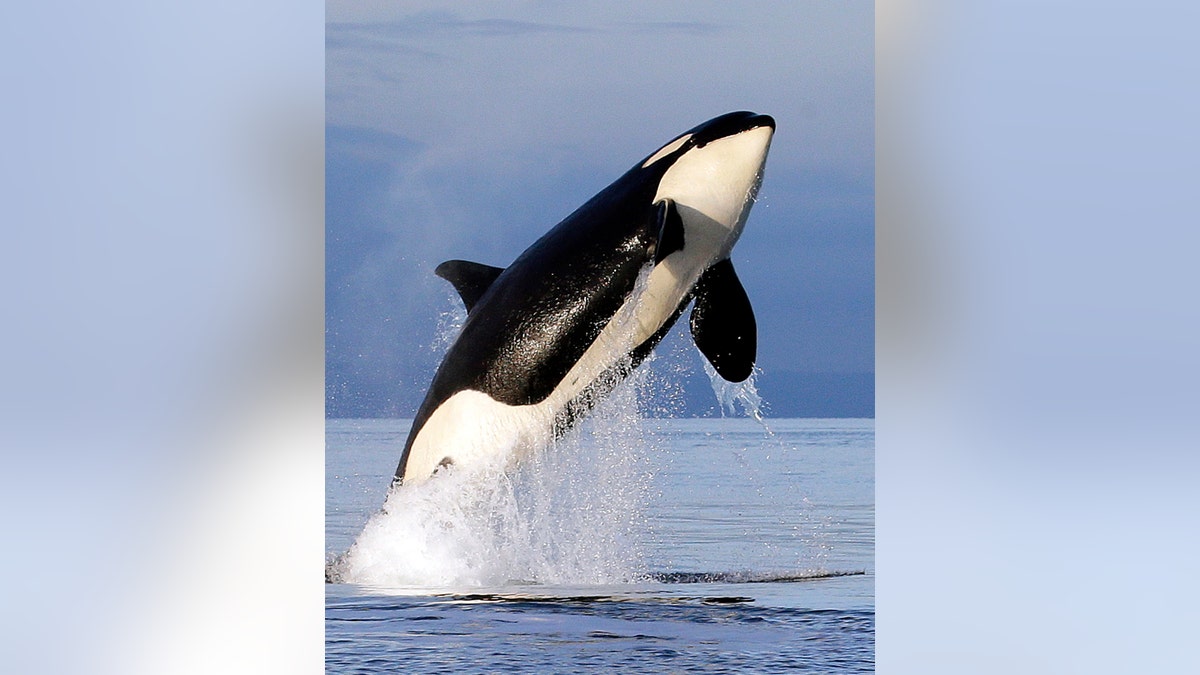
FILE - In this Jan. 18, 2014, file photo, an endangered southern resident female orca leaps from the water while breaching in Puget Sound, west of Seattle. (AP Photo/Elaine Thompson, File)
Two more killer whales in Puget Sound are in poor health and will likely be dead by the summer, according to an expert on the critically endangered population of orcas.
After three deaths in 2018, there are only 74 southern resident killer whales left in Puget Sound, the lowest number in 35 years.
Drone photography taken this past September showed the ailing population of orcas known as the southern residents went into the winter thinner than they were when the whales arrived in the San Juan Islands last summer.
KILLER WHALES ARE DYING OFF IN THE PACIFIC NORTHWEST
They also are lighter in weight than Puget Sound's so-called northern resident population of killer whales, which have been steadily growing in population for the past 40 years in their home waters primarily in northern British Columbia and southeast Alaska, where they have access to more fish and cleaner and quieter water. The northern residents gave birth to 10 new calves last year.
The Seattle Times reports Center for Whale Research founding director Ken Balcomb said photos taken of a southern resident orca known as J17 on New Year's Eve showed the 42-year-old female has so-called peanut head — a misshapen head and neck caused by starvation. In addition, a 27-year-old male known as K25 is failing, also from lack of sufficient food. He lost his mother, K13, in 2017 and is not successfully foraging on his own.
“Unfortunately, J17 has not improved in health and showing a true peanuthead now,” explained the Center for Whale Research, in a Facebook post on Jan. 2.
MOURNING ORCA MOTHER CARRIES DEAD CALF FOR FIFTH DAY
Several southern resident whales were documented to be pregnant in September, but so far there has been no sign of babies. The southern residents have not had a successful pregnancy in three years.
Losing J17 would be a blow to the southern residents because she is a female still of reproducing age, said Deborah Giles, a research scientist for University of Washington Center for Conservation Biology.
Giles said she was not surprised to hear about K25. The social dynamics of the southern residents, in which older females help their pod, and especially their sons by sharing food, is both a blessing and a curse if that female dies, Giles said.
ORCA THAT CARRIED DEAD, DECOMPOSING CALF FOR WEEKS NOW RETURNS TO FUN WITH FRIENDS
"These large, adult, hungry males benefit by the females in their family," Giles said. "There probably is still family foraging going on, but not like he had when his mom was alive."
The orcas’ strong social bonds were highlighted in heartbreaking fashion last year when a southern resident whale carried her dead calf for 17 straight days near Victoria, British Columbia.
The baby orca was the first calf born in three years to the endangered population of killer whales, according to the Center for Whale Research. Scientists were stunned by the length of the mother’s mourning period, noting that more than 24 hours of grieving is unusual.
KILLER WHALES SURROUND NEW ZEALAND WOMAN IN STUNNING DRONE FOOTAGE
The orcas differ from other killer whales because they eat salmon rather than marine mammals, with the southern resident whales mostly eating chinook salmon.
Ocean conditions and poor river migration, with warm water and low flows, have hurt chinook salmon returns in the past several years.
The U.S. government’s Marine Mammal Commission notes that roughly half of all southern resident killer whales were removed from the population due to shooting prior to 1960 and live capture in the 1960s and 1970s. After the banning of these activities, however, the population grew from 71 in 1976 to 98 in 1995. The population, however, has declined since them. “The prospects for recovery appear bleak,” it warns, on its website.
The EPA also notes that the population of southern resident killer whales is closely tied to the overall health of the Salish Sea ecosystem, which includes Puget Sound, the Strait of Juan de Fuca and the Strait of Georgia.
Fox News’ Kathleen Joyce and the Associated Press contributed to this article. Follow James Rogers on Twitter @jamesjrogers








































